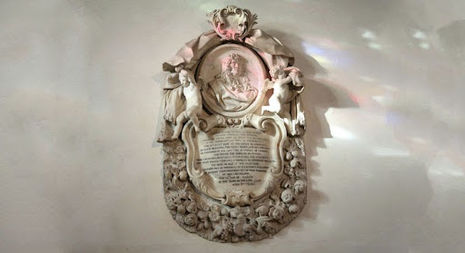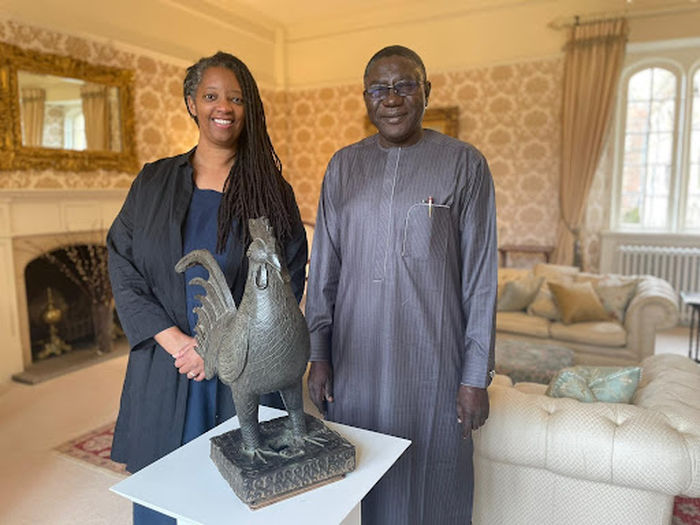Jesus College appeals to remove memorial of patron with slave trade connections
The college will make its case for the removal of the memorial of Tobias Rustat before the consistory courts in the Diocese of Ely early next year

Jesus College will appear before an ecclesiastical court early next year to put forth its case to remove the memorial of Tobias Rustat, one of the largest benefactors of the college and who has links to the slave trade.
The memorial in the college chapel has been described as "one of the most important pieces of funerary art in the country.”
Rustat was an investor in the Royal African Company (RAC) and also “took a role in running the RAC, being elected for a yearly term as an Assistant (the rough equivalent of a Director) in the years 1676, 1679, and 1680.”
According to historian William Pettigrew: “The Royal African Company shipped more enslaved African women, men, and children to the Americas than any other single institution during the entire period of the transatlantic slave trade.”
The case to remove the plaque dedicated to Rustat will be heard in the Diocese of Ely, following the college’s announced proposal to the Church of England to remove the memorial from their chapel in November 2020. This process is being followed because the chapel is a Grade I listed building (by historical and architectural importance) and changes to it fall under Faculty Jurisdiction Rules operated by the Church of England.
149 Jesus alumni wrote an open letter to the college in July, calling for the plaque to be moved to a place “where it can be understood in its full context”, in agreement with the Jesus College Legacy of Slavery Working Party recommendations that emphasised the “obligation to remember his legacy in College today with proper contextualisation.”
The Working Party’s Interim Report (July-October 2019) “estimates the total value of Rustat’s gifts to the College at £3,230 (the equivalent of £500,000 today).”
Jesus College Master Sonita Alleyne justified the proposed relocation of the memorial: “It’s the fact that it’s a chapel and it’s a place of worship.” She continued: “In this day and age, in this community that we have in our chapel, with our very diverse student body, are you really saying to young people as they come in, this is what part of being in a place like Cambridge is about?”
Some alumni are against this decision, with some donors threatening to give their money to other causes. Descendents of Rustat have also lodged a complaint with the college and the Church of England. Stephen Hemsted, Rustad’s 10th great-nephew, justified preserving the memorial claiming that Rustad “made his money in the court of Charles II. It’s clear that the bulk of his wealth came from things [that were] nothing to do with slavery, so the money that was given to Jesus College clearly has nothing to do with slavery.”
Head of Church Buildings and Pastoral for the Diocese of Ely, Geoffrey Hunter commented at the time of the initial proposal: “This is a live issue for churches and chapels across the country. The College has been both swift and very thorough in its approach to dealing with Rustat’s legacy, and sets a very helpful example for other places of worship.”
Jesus College became the first institution in the world to return a looted Benin Bronze to Nigeria last month (27/10).
 News / Cambridge academics stand out in King’s 2026 Honours List2 January 2026
News / Cambridge academics stand out in King’s 2026 Honours List2 January 2026 Comment / Plastic pubs: the problem with Cambridge alehouses 5 January 2026
Comment / Plastic pubs: the problem with Cambridge alehouses 5 January 2026 News / Cambridge businesses concerned infrastructure delays will hurt growth5 January 2026
News / Cambridge businesses concerned infrastructure delays will hurt growth5 January 2026 News / AstraZeneca sues for £32 million over faulty construction at Cambridge Campus31 December 2025
News / AstraZeneca sues for £32 million over faulty construction at Cambridge Campus31 December 2025 Interviews / You don’t need to peak at Cambridge, says Robin Harding31 December 2025
Interviews / You don’t need to peak at Cambridge, says Robin Harding31 December 2025










